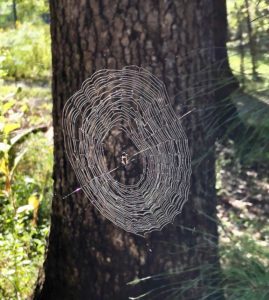
Soon after my wife, Jeanne, left this world she communicated a cosmic perspective on our Earth’s crises. Essentially, she described a tremendous backlog of souls, clamoring to reenter earthly existence to further their experience of physicality and the sensuality of being in a human body.
Her new mission in infinity is to hasten the spiritual evolution of those still in human form that they might be ready, upon departure from Earth, to venture further into the greater mystery of evolved life, beyond attachment to the human body. Her guidance, channelled through Jan’s daily Soulbytes, reflects this intent.
Carl Jung, from the perch of a wise, fully lived life, saw that the greatest problem for humanity was overpopulation, as it alone is fatally straining the Earth’s resources. Our current Earth crises all reflect land disputes driven by sprawling populations, or diminished resources resulting from climate change and failures in human management.
The issue of overpopulation strains our world at both a soul level and a physical level. At an individual level, we are all now, in this life, granted the opportunity to address this Earth and this cosmic crisis through our commitment to a spiritual fulfillment in this life, which will eventuate in a readiness for new levels of life beyond Earth’s riches.
The shamans of ancient Mexico saw clearly that the greatest opportunity for spiritual evolution in human life was through the defeat of the ego’s obsession with its own self-importance. Self-importance is not self-esteem. Self-esteem is the ability to approach life with innocence, unsullied by the judgments of others.
Self-importance is rooted in self-doubt. The ego tries to resolve its doubts about its worthiness through the quantity and quality of attention it receives from others. It tends to either inflate itself with superiority or deflate itself with inferiority. This obsession leads to struggles with entitlement, fairness, and victimhood.
The shamans of ancient Mexico discovered the value of interactions with petty tyrants in our lives in overcoming our trials with self-importance. Petty tyrants are people or circumstances that offend us.
However inappropriate the behavior of another is, to be offended triggers issues of unfairness and victimhood. Mastery of one’s actual presented challenge then gets waylaid by feelings of resentment and entitlement. Though it may be necessary to set boundaries, the burden of negative thinking and feeling compromises one’s ability to respond effectively.
At the deepest level, nature itself has a hostile side. Petty tyrants are part of nature. Consider the devastations in Maui, Afghanistan and, most recently, Acapulco. Of what value would it be to be offended by an earthquake, a hurricane, or a fire? Their occurrence, however devastating, is simply objective, requiring focused rescue efforts. At the deepest level, is not nature showing us that we must all come together and master the real problem of human overpopulation?
Instead, self-importance allows us to be offended and to engage our vital energy and resources on wars. Boundaries must be set, respected and defended, but being offended leads to excesses that perpetuate conflict and miss the true mark of needed change.
To not be offended by those who hurt us is to accept and learn from the hostile side of nature, in whatever form it is expressed. By not being offended, we refine our ability to respond with actions in alignment with the truth of Spirit versus the resentment of ego. This is the spiritual evolution that graduates us from Earth School, as we move into a life of no self-importance.
Buddha emphasized the role of service in facilitating spiritual advancement. In service, we reach beyond the ego’s narcissistic worldview and value our neighbors as part of our ultimate soul group. The most refined practice of service is anonymous. To live a life of anonymous service is the ultimate life of no self-importance.
Anonymous service is good deeds performed in the dark, where there is no possibility of the kudos of another’s attention. To send one’s healing intent to another in silent prayer, no energetic strings attached, is anonymous service. To send that healing intent anonymously to one’s most hated enemies is practicing transcendent love, the currency of higher planes of existence.
Of course, when we send healing intent to another, we are really sending suggestions telepathically to their subconscious minds. It is always up to the receiver to take responsibility for the suggestions they choose to live by. Nonetheless, it is of great service to anonymously send suggestions from the truth of the heart.
With the refinement of no self-importance, we are irresistibly drawn to the challenge and growth potential of the life that is available beyond the human form.
May we take full advantage of the petty tyrants currently active and soon to come upon the Earth. To arrive at a non-offended life of secret service is the ticket to spiritual evolution, reachable through the loss of self-importance. Nature herself is leading us to that necessary advancement.
May we all advance,
Chuck




